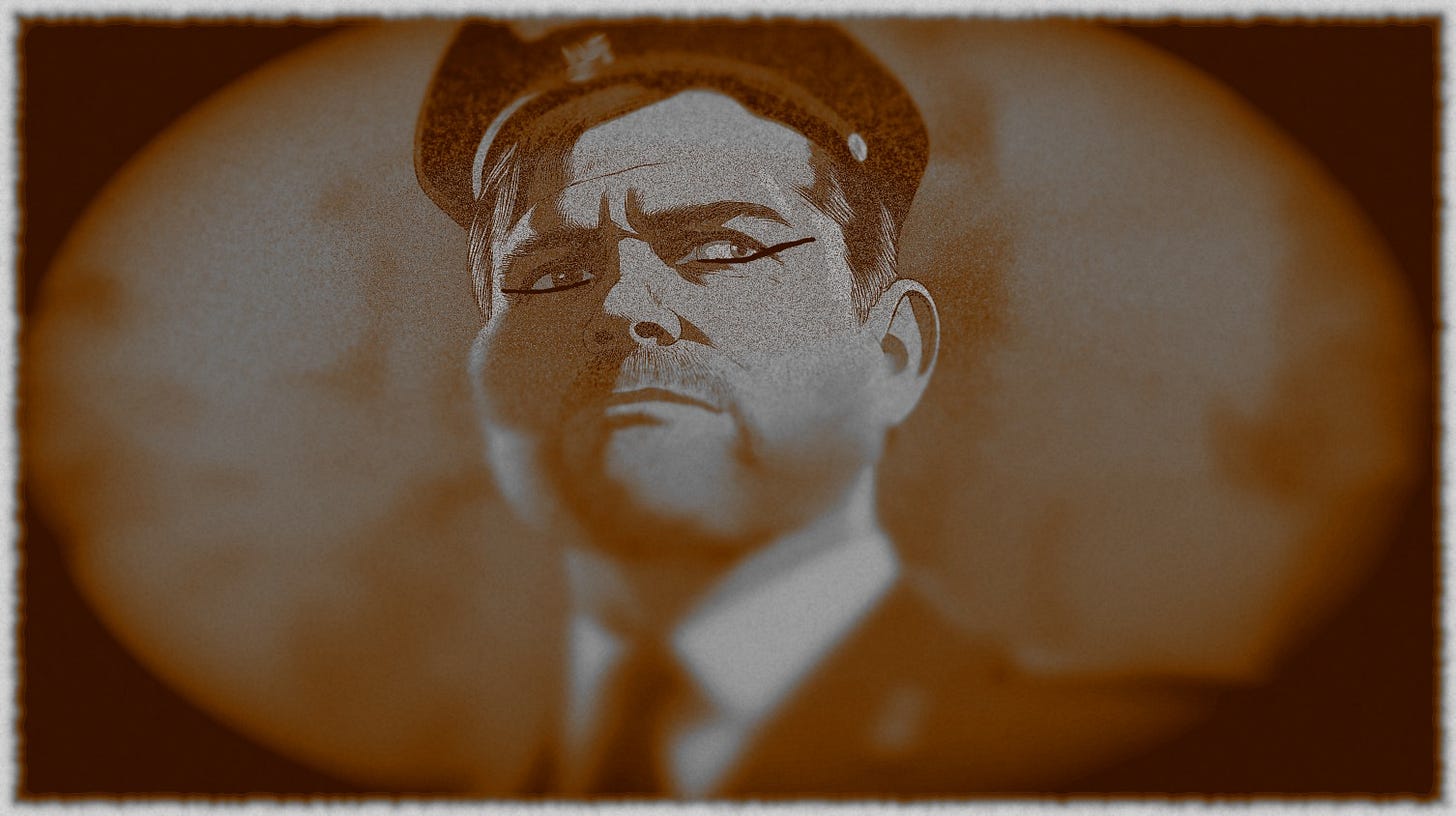‘Who Goes Nazi?’ — An 83-Year-Old Prediction of JD Vance
Dorothy Thompson, the first American correspondent to be kicked out of Nazi Germany, described the archetypes of ‘who goes Nazi’ more than 80 years ago. It’s time we listen
***Please take out a membership to support the light of truth.***
Last night, we saw a 90-minute infomercial for normalizing Nazis.
I don’t use the word lightly, I use it precisely. Nothing neo about the criminal gang trying to take over America. They’re using a cruel and effective fascist playbook that I have documented on these pages in depth and with receipts.
For the record:
So I’m not sure what it is going to take for the Democrats to understand the gravity of our situation, but playing nice with Nazis is not going to save America.
Giving them a national platform to seed their lies into our consciousness is not going to save America. Allowing JD Vance — who hosts internationally banned RT on his Rumble platform — to lie to the world, while trying to minimize Russia’s attacks on the US and mind trick us into believing that defending our nation against covert influence operations is a disruption of free speech, only helps our enemies.
We have history to guide us on what we should be doing in this grave hour, and last night, we set ourselves back considerably. By now, we should understand that lying is the message.
Allow me to turn to yet another female reporter from history to explain the urgency.
As with Bella Fromm’s diary, which I excerpted specifically to make people aware that we need to treat this criminal gang as we would any other criminal gang before it’s too gaddam late, I am sharing with you excerpts from Dorothy Thompson’s report from 1941 in Harper’s Magazine: ‘Who Goes Nazi?’
Born three years after Fromm in 1893, Thompson was the first American journalist to be expelled from Nazi Germany in 1934. Her accolades are numerous, her second husband famous (Sinclair Lewis), but what is important for this article is she witnessed firsthand the rise of the National Socialist party as the head of the New York Evening Post Berlin bureau.
I know of her work because the German authors of The Gravediggers refer to both Fromm and Thompson’s reporting considerably in their telling of the last winter of the Weimar republic. But it was in a conversation with my friend Wes Clark Jr. that I learned of her Harper’s report and its stunning prediction of the Rise of the JD Vances.
According to Thompson’s biographer, Peter Kurth, she was “the undisputed queen of the overseas press corps, the first woman to head a foreign news bureau of any importance.”
And as with so many important women from history, she has largely been written out of the annals in favor of her male peers. Once again, I am writing the women back in, so we can learn from their astute observations about how you treat genocidal criminal gangs who intend to take away all of our fucking rights in their vampire quest for power.
From her report in Harper’s in 1941:
It is an interesting and somewhat macabre parlor game to play at a large gathering of one’s acquaintances: to speculate who in a showdown would go Nazi. By now, I think I know. I have gone through the experience many times—in Germany, in Austria, and in France. I have come to know the types: the born Nazis, the Nazis whom democracy itself has created, the certain-to-be fellow-travelers. And I also know those who never, under any conceivable circumstances, would become Nazis.
It is preposterous to think that they are divided by any racial characteristics. Germans may be more susceptible to Nazism than most people, but I doubt it. Jews are barred out, but it is an arbitrary ruling. I know lots of Jews who are born Nazis and many others who would heil Hitler tomorrow morning if given a chance. There are Jews who have repudiated their own ancestors in order to become “Honorary Aryans and Nazis”; there are full-blooded Jews who have enthusiastically entered Hitler’s secret service. Nazism has nothing to do with race and nationality. It appeals to a certain type of mind.
In a stunning moment in Bella Fromm’s Blood & Banquets book, she notes that in the uncomfortable moments when a Nazi would be found to have Jewish blood, she says a quote by Reich Marshall Hermann Goering — described as a rotund oaf whose medals jangled across the dance floor — was often repeated: “I decide who is a Jew!” Upon further probing, Goering may have gotten the quote from a former mayor of Vienna, but regardless, the message is an important one.
Thompson continued:
The Disease of a Generation
It is also, to an immense extent, the disease of a generation—the generation which was either young or unborn at the end of the last war. This is as true of Englishmen, Frenchmen, and Americans as of Germans. It is the disease of the so-called “lost generation”…
At any rate, let us look round the room.
The gentleman standing beside the fireplace with an almost untouched glass of whiskey beside him on the mantelpiece is Mr. A, a descendant of one of the great American families. There has never been an American Blue Book without several persons of his surname in it. He is poor and earns his living as an editor. He has had a classical education, has a sound and cultivated taste in literature, painting, and music; has not a touch of snobbery in him; is full of humor, courtesy, and wit. He was a lieutenant in the World War, is a Republican in politics, but voted twice for Roosevelt, last time for Willkie. He is modest, not particularly brilliant, a staunch friend, and a man who greatly enjoys the company of pretty and witty women. His wife, whom he adored, is dead, and he will never remarry.
He has never attracted any attention because of outstanding bravery. But I will put my hand in the fire that nothing on earth could ever make him a Nazi. He would greatly dislike fighting them, but they could never convert him. . . . Why not?
Beside him stands Mr. B, a man of his own class, graduate of the same preparatory school and university, rich, a sportsman, owner of a famous racing stable, vice-president of a bank, married to a well-known society belle. He is a good fellow and extremely popular. But if America were going Nazi he would certainly join up, and early. Why? . . . Why the one and not the other?
Mr. A has a life that is established according to a certain form of personal behavior. Although he has no money, his unostentatious distinction and education have always assured him a position. He has never been engaged in sharp competition. He is a free man. I doubt whether ever in his life he has done anything he did not want to do or anything that was against his code. Nazism wouldn’t fit in with his standards and he has never become accustomed to making concessions.
Mr. B has risen beyond his real abilities by virtue of health, good looks, and being a good mixer. He married for money and he has done lots of other things for money. His code is not his own; it is that of his class—no worse, no better, He fits easily into whatever pattern is successful. That is his sole measure of value—success. Nazism as a minority movement would not attract him. As a movement likely to attain power, it would.
And here is where we get to the description of the prototype of JD Vance, Peter Thiel’s replicant:
The saturnine man over there talking with a lovely French emigree is already a Nazi. Mr. C is a brilliant and embittered intellectual. He was a poor white-trash Southern boy, a scholarship student at two universities where he took all the scholastic honors but was never invited to join a fraternity. His brilliant gifts won for him successively government positions, partnership in a prominent law firm, and eventually a highly paid job as a Wall Street adviser. He has always moved among important people and always been socially on the periphery. His colleagues have admired his brains and exploited them, but they have seldom invited him—or his wife—to dinner.
He is a snob, loathing his own snobbery. He despises the men about him—he despises, for instance, Mr. B—because he knows that what he has had to achieve by relentless work men like B have won by knowing the right people. But his contempt is inextricably mingled with envy. Even more than he hates the class into which he has insecurely risen, does he hate the people from whom he came. He hates his mother and his father for being his parents. He loathes everything that reminds him of his origins and his humiliations. He is bitterly anti-Semitic because the social insecurity of the Jews reminds him of his own psychological insecurity.
Pity he has utterly erased from his nature, and joy he has never known. He has an ambition, bitter and burning. It is to rise to such an eminence that no one can ever again humiliate him. Not to rule but to be the secret ruler, pulling the strings of puppets created by his brains. Already some of them are talking his language—though they have never met him.
There he sits: he talks awkwardly rather than glibly; he is courteous. He commands a distant and cold respect. But he is a very dangerous man. Were he primitive and brutal he would be a criminal—a murderer. But he is subtle and cruel. He would rise high in a Nazi regime. It would need men just like him—intellectual and ruthless. But Mr. C is not a born Nazi. He is the product of a democracy hypocritically preaching social equality and practicing a carelessly brutal snobbery. He is a sensitive, gifted man who has been humiliated into nihilism. He would laugh to see heads roll.
I encourage you to read her entire article, and see what other prototypes you can spot for the criminal gang trying to take down America. She could just as easily be writing about Mike Johnson, that other smooth talking, boyish fascist, so close to the top levers of power.
Thompson continues:
I grin bitterly to myself, thinking that if we ever got into war with the Nazis (one partygoer) would probably be interned, while (other guests) would be spreading defeatism at all such parties as this one. “Of course I don’t like Hitler but . . .”
It’s fun—a macabre sort of fun—this parlor game of “Who Goes Nazi?” And it simplifies things—asking the question in regard to specific personalities.
Kind, good, happy, gentlemanly, secure people never go Nazi. They may be the gentle philosopher whose name is in the Blue Book, or Bill from City College to whom democracy gave a chance to design airplanes—you’ll never make Nazis out of them. But the frustrated and humiliated intellectual, the rich and scared speculator, the spoiled son, the labor tyrant, the fellow who has achieved success by smelling out the wind of success—they would all go Nazi in a crisis.
Believe me, nice people don’t go Nazi. Their race, color, creed, or social condition is not the criterion. It is something in them.
Those who haven’t anything in them to tell them what they like and what they don’t—whether it is breeding, or happiness, or wisdom, or a code, however old-fashioned or however modern, go Nazi. It’s an amusing game. Try it at the next big party you go to.
We do not have the benefit of being amused.
Time is not on our side.
****
Related:
****
Bette Dangerous is a reader-funded magazine. Thank you to all monthly, annual, and founding members.
I expose the corruption of billionaire fascists, while relying on memberships to keep the light on.
Thank you in advance for considering the following:
Share my reporting with allies
Buying my ebooks
A private link to an annual membership discount for older adults, those on fixed incomes or drawing disability, as well as activists and members of the media is available upon request at bettedangerous/gmail. 🥹
More info about Bette Dangerous - This magazine is written by Heidi Siegmund Cuda, an Emmy-award winning investigative reporter/producer, author, and veteran music and nightlife columnist. She is the cohost of RADICALIZED Truth Survives, an investigative show about disinformation and is part of the Byline Media team. Thank you for your support of independent investigative journalism.
🤍
Begin each day with a grateful heart.
🤍
Dorothy Thompson, courtesy Wikipedia











Great article. The problem (speaking here as a retired psychiatrist) is that we have so many damaged people in this country, people damaged by those who raised them. These people are not likely to ever be fixed in any meaningful way. More are being produced all the time. The "happy" people that. Dorothy Thompson refers to in her article are similarly products of their upbringing. It's harder to raise a happy person than a humiliated, embittered one, unfortunately, and parents of happy offspring tend to have fewer children on the whole.
Brilliant! =] 💙💙💙🌊🌊🌊🏄🏄♂️🌅